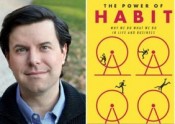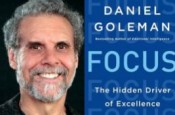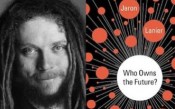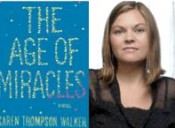Q&A: CHARLES DUHIGG – THE POWER OF HABIT
Written on May 16th, 2014 |
Aired 08/26/12
Humans are not alone in being creatures of habit, but can we do anything about it?
Brain science has learned a lot about habits over the last few years. On the one hand, that gives corporations new power with which to manipulate us, but it also gives us greater power over our own behavior.
What is a habit? Are habits positive – a sign of cultivation and industry, or negative, a sign of weakness and mindlessness? Or are they neutral, their value up to us?
Today’s guest, CHARLES DUHIGG an award-winning reporter for the New York Times, has written the best-selling THE POWER OF HABIT: Why We Do What We Do in Life and Business. He tells us that at its most basic level, a habit is a simple neurological loop: a cue (my mouth feels gross), a routine (I should brush my teeth), and a reward (ahhh, minty fresh!). Backing out of the driveway, replying to emails, running before work – many of our most basic daily actions are not, in fact, the products of well considered decision-making, but outgrowths of habits we often don’t even realize exist.
We’ll talk about what a habit is, how they are formed, and how we can put what we’ve learned about habits into practice, so that we are at least somewhat their masters rather than their slaves.
We will also discuss Duhigg’s investigative New York Times series on Apple, including their labor practices and why they don’t manufacture in the U.S.
Free Forum Q&A- DANIEL GOLEMAN FOCUS: Hidden Driver of Excellence
Written on January 21st, 2014 |
Aired: 01/19/14
I don’t have to tell you how many messages, interruptions and distractions you are inundated with every day. Add to that the stress placed on so many of us by the many roles we play everyday – parent, partner, friend, worker, citizen. The very critical skill or quality of attention is under siege.
DANIEL GOLEMAN, the psychologist, journalist, and best-selling author who wrote the book on Emotional Intelligence, has a new book, Focus: The Hidden Driver of Excellence. In it, he delves into new, surprising findings from neuroscience labs and explains why attention is a little-noticed mental asset that makes a huge difference in how well we find our way in our personal lives, our careers, and in virtually everything we do. Like a muscle, use attention poorly and it withers; work it in the right way and it strengthens. But Goleman doesn’t only consider the personal need for attention but also the way evolution has presented humans a challenge when it comes to dealing with long term threats like climate change.
Free Forum Q&A: JARON LANIER, Author of WHO OWNS THE FUTURE?
Written on November 26th, 2013 |
Aired: 11/24/13
After its recent IPO, Twitter is valued at nearly $25Billion. Now what is Twitter? Millions of tweets created and shared by users plus some ads. But how many users get a piece of that $25Billion? Well, none.
Where would Facebook be without Friends? What would Twitter, Amazon, Yelp, and any network whose value is based on our data, be without us – sharing photos and feelings, making purchases, registering opinions. More than programming or advertising, TV has always been about selling our eyeballs. Likewise, today’s online giants are selling our visits, our clicks, our shares.
JARON LANIER, in his new book, WHO OWNS THE FUTURE?, writes: “At the height of its power, Kodak employed more than 140,000 people and was worth $28 billion. They even invented the first digital camera. Today Kodak is bankrupt, and the new face of digital photography is Instagram. When Instagram was sold to Facebook for a billion dollars in 2012, it employed only 13 people. Where did all those jobs disappear? And what happened to the wealth that all those middle-class jobs created?”
He believes the emerging business model in which companies with relatively few employees profit off the participation of all of us, could doom any hope of a rebirth of the middle class. Lanier wants to solve a problem not many are talking about, and he envisions a radical solution — “a highly humanistic economy – one that will reward people for the valuable information they share with networks and the companies that control and profit from them.
Q&A: KAREN THOMPSON WALKER – Author, THE AGE OF MIRACLES
Written on July 10th, 2012 |
Aired 07/08/12
I seldom interview writers of fiction, but the debut novel THE AGE OF MIRACLES got my attention. It’s being heavily promoted as one of THE books of the summer. Enough so that I read the first couple of pages and I really like the writing. It’s about how one family in Southern California responds to a global crisis, the slowing of the earth, and the lengthening of days and nights. The writer, KAREN THOMPSON WALKER joins me for a delightful interview.
http://www.theageofmiraclesbook.com/
Q&A: JONAH LEHRER, Author, NYT #1 Best-Seller – IMAGINE: How Creativity Works
Written on April 11th, 2012 |
Aired 04/08/12
Do you consider yourself to be creative? Do you think of creativity as a gift, a talent, something you either have or you don’t? Do you find creativity to be a bit mystical or magical, dependent on luck, the muses, or higher powers?
Today’s guest, JONAH LEHRER, has written a book in which he looks at the latest brain science and attempts, in his words, “to collapse the layers of description separating the nerve cell from the finished symphony, the cortical circuit from the successful product.”
In Imagine: How Creativity Works, Lehrer makes clear, “Creativity shouldn’t seem like something otherworldly. It shouldn’t seem like a process reserved for artists or inventors or other “creative types.” After all, he points out, the human mind has the creative impulse built into its operating system, hard-wired into its most essential programming code.” Creativity is a variety of distinct thought processes that we can all learn to use more effectively. In the book, Lehrer reveals the importance of embracing the rut, thinking like a child, and daydreaming productively. He also shows how we can use this knowledge to make our neighborhoods more vibrant, our companies more productive, and our schools more effective.
